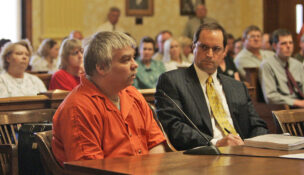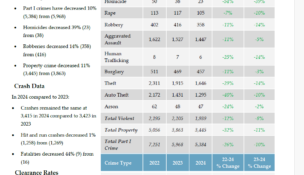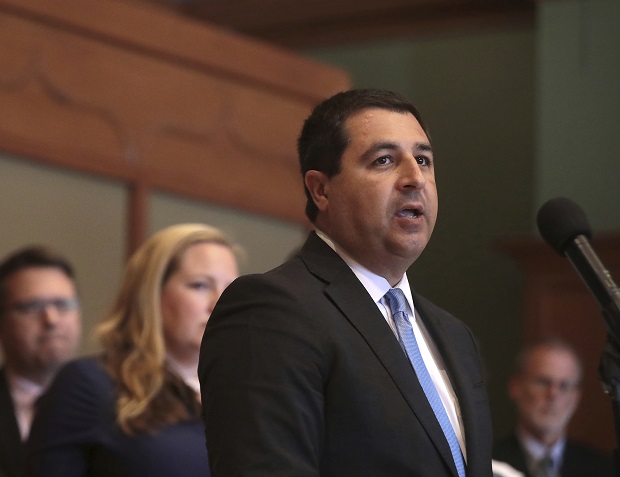Court considers ban on judges’ membership in political parties
By: dmc-admin//September 28, 2009//
A three-judge panel of the Seventh Circuit heard oral arguments on Sept. 17 in Milwaukee County Circuit Court Judge John Siefert’s challenge to the Supreme Court Rule prohibiting judges or judicial candidates from joining a political party.
At issue is whether avoiding even the appearance of partiality justifies the rule, as Assistant Attorney General Jennifer Sloan Lattis contended, or whether the restriction is only justified if the due process rights of litigants are implicated, as Judge Siefert’s attorney, Josiah Neeley, contended.
Lattis argued that the state has a compelling interest in the impartiality of the judiciary and the appearance of impartiality by keeping out partisan politics. The restriction on membership in political parties is a permissible restriction, she contended, because it in no way limits a judge’s ability to discuss his qualifications for office.
As a result, Lattis argued the restrictions are comparable to lawful time, place and manner regulations.
Lattis invoked the spirit of the recent U.S. Supreme Court opinion in Massey v. Caperton, 129 S.Ct. 2252 (2009), in which the Court held that it violated due process for a judge to hear a case after he had received more than $3 million in campaign contributions from one of the parties.
Lattis remarked, “What the Court understood is that appearance matters; [a] court has to look impartial. [A] court needs to look like it has integrity for the public to have confidence in it.”
However, Neeley argued that Massey was distinguishable because it relied on the due process clause.
“A flat out prohibition on party membership must be tied to the due process interest.”
Neeley called Massey a case involving “extreme circumstances,” in light of the large expenditures involved, and said that the remedy of recusal in individual cases is adequate to protect the parties’ interest in due process and the state’s interest in impartiality.
“There is no indication that a blanket prohibition is appropriate,” he stated.
Siefert is also challenging the rule prohibiting judges from directly soliciting campaign contributions and from endorsing partisan candidates for other offices.
Lattis defended the rule against personal solicitation of contributions as necessary to avoid coercion. Solicitation by a judge, as opposed to a campaign committee, is different, she argued, because that is when the donor is most likely to feel coerced and uncomfortable. She dismissed the restriction on personal solicitation as a “minor inconvenience.”
But Neeley countered, “No court has ever said that potential contributors have a right not to be made uncomfortable by solicitation. The pressure to contribute is just an inherent feature of elections.”
Legal News
- Steven Avery prosecutor Ken Kratz admits ‘mistakes were made’
- Colombian national extradited to Milwaukee faces International narcotics-trafficking conspiracy charge
- MPD: Milwaukee homicides down nearly 40 percent compared to last year
- EVERS: Republican lawmakers No-Show at special meeting to release statewide PFAS funding, stabilize healthcare access
- Wisconsin ICAC Task Force conference on Missing and Exploited Children highlights increase in sextortion cases
- More than 300 Wisconsin officers back in law enforcement after being fired or forced out
- Former Trump staffer who said to ‘fan the flame’ after 2020 loss hired to lead Wisconsin GOP
- Gov. Evers appoints David Casey to Serve as DOR Secretary
- Former Marine sentenced for Molotov Cocktail attack against Planned Parenthood Clinic
- ABA names 34th Annual Margaret Brent Women Lawyers of Achievement Awards honorees
- FBI launches criminal investigation into Key Bridge collapse
- Man charged in slaying after woman’s leg found at Milwaukee-area park
WLJ People
- Power 30 Personal Injury Attorneys – Russell Nicolet
- Power 30 Personal Injury Attorneys – Benjamin Nicolet
- Power 30 Personal Injury Attorneys – Dustin T. Woehl
- Power 30 Personal Injury Attorneys – Katherine Metzger
- Power 30 Personal Injury Attorneys – Joseph Ryan
- Power 30 Personal Injury Attorneys – James M. Ryan
- Power 30 Personal Injury Attorneys – Dana Wachs
- Power 30 Personal Injury Attorneys – Mark L. Thomsen
- Power 30 Personal Injury Attorneys – Matthew Lein
- Power 30 Personal Injury Attorneys – Jeffrey A. Pitman
- Power 30 Personal Injury Attorneys – William Pemberton
- Power 30 Personal Injury Attorneys – Howard S. Sicula











